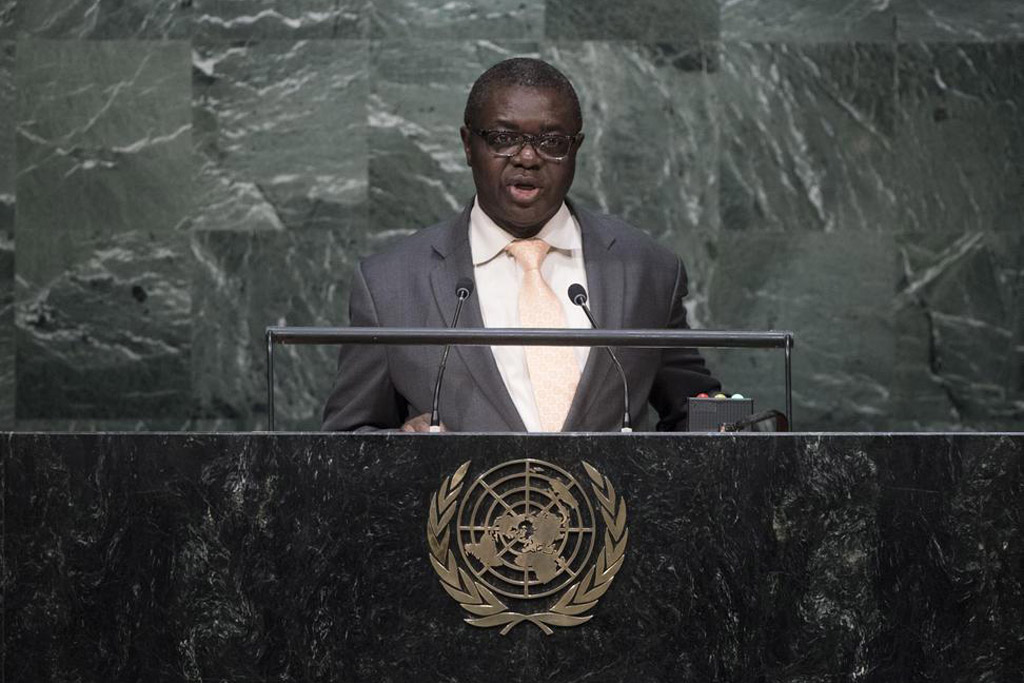At UN Assembly, speakers from African nations spotlight sustainable development, efforts to combat terrorism
He said the founding fathers of the United Nations wanted to promote social progress and better living conditions for everyone. There had been much human progress and scientific and technological improvements since then. Yet, even with the undeniable advances, the international community must address the numerous existing weaknesses in order to ban the spectre of war.
“There are now many conflicts fed by non-State actors and small extremist groups, even pirates,” he said, also stressing that climate change, with its dangerous effects on the environment, and the migration crisis were among the crises representing threats to the stability of States everywhere.
Africa had not been spared the spate of conflicts, he said, highlighting the terrorist threats created by Boko Haram in Nigeria, Niger, Cameroon and Chad, for which an international response was needed. Tensions persisted in Mali and South Sudan as well as an ongoing conflict in the Central African Republic, requiring the international community’s support.
“Peace and stability should be backed by a minimum of economic development that benefits the broadest number of people,” he said. An effective platform of financing for sustainable development is therefore necessary. To this end, Congo had a national sustainable development strategy that it would pursue.
Also taking the floor, Niger’s Minister of State, Aïchatou Boulama Kané, said the situation in Libya is a serious threat to her country and to the entire Sahel region. Niger is actively committed to combatting the scourge of terrorism in all its forms in cooperation with its partners, she said.

Foreign Minister Aïchatou Kané Boulama of Niger addresses the general debate of the General Assembly’s seventieth session. UN Photo/Kim Haughton
She called for greater international support for the Libyan people in their fight against terrorist groups which are compromising efforts at genuine national reconciliation – a “sine quo non condition to restoring peace and stability” and to the economic and social development of the country.
As for “the Boko Haram” sect which is disturbing the peace in the Lake Chad Basin, she continued, it will surely be defeated by the multilateral joint force established by Cameroon, Niger, Nigeria, Chad and the members of the Lake Chad Basin, as well as Benin.
While the wounds left by the structural adjustment programmes from 1980 to 1990 had not yet healed, the economic and financial crisis of 2008 had caused further difficulties, leaving the economies of the developing countries particularly vulnerable, she continued. Niger is implementing a programme of economic growth and development aimed at providing access to basic social services for all people, she said, stressing the importance of financing for development, capacity-building assistance, facilitation of trade, technology and private investment as necessary ingredients toward achieving the goals of the 2030 Development Agenda.
At the same time, Ms. Boulama Kané continued, good governance is an essential part of development and she called on “all partners” to support Niger in its 2016 presidential, legislative and local elections to ensure that they are transparent, free and inclusive. “The international system also needs democratic governance,” she added, as the challenges it faces are of a “planetary nature” and require a global response. In its 70th year, the United Nations should examine itself and make adjustments to reflect the current reality of the present-day world, particularly the workings of the Security Council and the General Assembly.
The Permanent Representative of Guinea-Bissau to the United Nations, João Soares Da Gama said that despite the recurrent instability, his country’s determination to build a viable State remains intact. With the return to constitutional normality, the Government has made efforts to provide basic conditions required to relaunch its economy and tackle new challenges in consolidating peace and security.

Ambassador João Soares Da Gama of Guinea-Bissau to the United Nations addresses the general debate of the General Assembly’s seventieth session. UN Photo/Kim Haughton
The 2015-2025 “Terra Ranka” Development Strategy would guide Government actions, he continued, explain that the framework is consistent with the goals established in the 2030 Agenda. The implementation of that Agenda would contribute to his country’s sustainable development. In the same vein, the fulfilment by donor countries of their commitments to public development aid and other funding was crucial for the most vulnerable countries.

